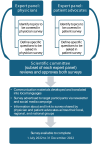Hepatocellular Carcinoma in Asia: Physician and Patient Perspectives on Surveillance, Diagnosis, and Treatment
- PMID: 38995318
- PMCID: PMC11347480
- DOI: 10.1007/s12029-024-01089-5
Hepatocellular Carcinoma in Asia: Physician and Patient Perspectives on Surveillance, Diagnosis, and Treatment
Abstract
Purpose: In several Asian countries, hepatocellular carcinoma (HCC) is a leading cause of cancer deaths. HCC risk factors in Asia differ from those elsewhere and are changing with the treatment landscape as systemic treatment options increase. This study was conducted to gain insight from physicians and patients into HCC screening, diagnosis, and treatment strategies in Indonesia, Korea, Malaysia, Singapore, Taiwan, Thailand, and Vietnam.
Methods: Two cross-sectional, anonymized, online surveys were completed between July and December 2022 by physicians diagnosing and treating HCC (55 questions on risk factors, surveillance, diagnosis, and treatment) and patients ≥ 18 years old diagnosed with HCC (36 questions on disease knowledge, quality of life, and experiences of diagnosis and treatment).
Results: Responses were received from 276 physicians in all 7 countries and 130 patients in Thailand, Taiwan, and Vietnam. From the physician's perspective, surveillance programs are widespread but identify insufficient HCC cases; only 18% are early-stage HCC at diagnosis. From the patient's perspective, knowledge of risk factors increases after diagnosis, but few seek support from patient associations; patients would benefit from better communication from their doctors. Treatment affordability and side effects are key issues for patients.
Conclusions: Awareness of the risk factors for HCC should be raised in primary care and the general population, and surveillance should identify early-stage HCC. Because patients rely on their doctors for support, doctors should better understand their patients' needs, and patients could be supported by trained nurses or case managers. Programs are needed to increase patients' access to proven HCC treatments.
Keywords: Asia; Diagnosis; Hepatocellular Carcinoma; Surveys and questionnaires; Therapeutics.
© 2024. The Author(s).
Conflict of interest statement
Irsan Hasan, Mahir Karababa, Rosmawati Mohamed, Evy Ratnawati, Wattana Sukeepaisarnjaroen, Tawesak Tanwandee, Tran Thi Thanh Huong, and Wendy Wang declare that they have no relevant financial or non-financial interests to disclose. Young-Suk Lim has received grants or contracts; consulting fees; payment or honoraria for lectures, presentations, speakers bureaus, manuscript writing, or educational events; payment for expert testimony; and support for attending meetings or travel from Gilead Sciences. Sheng-Nan Lu and Cam Phuong Pham have received payment or honoraria for lectures, presentations, speakers bureaus, manuscript writing, or educational events from Bayer, MSD, and Roche. Murallitharan Munisamy has received payment or honoraria for lectures, presentations, speakers bureaus, manuscript writing or educational events from Astra-Zeneca, MSD, and Pfizer; receives a salary from the National Cancer Society Malaysia and has an unpaid leadership or fiduciary role in the Malaysian Medical Association Public Health Society; and holds stock or stock options in Sanofi; his institution has received grants or contracts from Astellas Pharma Inc. and MSD. Chee-Kiat Tan has received payment or honoraria for lectures, presentations, speakers bureaus, manuscript writing or educational events from Abbott Laboratories, Astellas, Eisai, Gilead Sciences, and Roche Diagnostics; support for attending meetings or travel from Gilead Sciences; and fees for his participation on a Data Safety Monitoring Board or Advisory Board from Abbott Laboratories, Eisai, Gilead Sciences, and Roche Diagnostics.
Figures
Similar articles
-
Statewide Survey of Primary Care and Subspecialty Providers on Hepatocellular Carcinoma Risk-Stratification and Surveillance Practices.Dig Dis Sci. 2024 Jul;69(7):2437-2449. doi: 10.1007/s10620-024-08442-5. Epub 2024 Apr 23. Dig Dis Sci. 2024. PMID: 38652392
-
Epidemiology, clinical-treatment patterns and outcome in 256 hepatocellular carcinoma cases.World J Gastroenterol. 2013 Jun 7;19(21):3207-16. doi: 10.3748/wjg.v19.i21.3207. World J Gastroenterol. 2013. PMID: 23745022 Free PMC article.
-
Practice patterns and attitudes of primary care providers and barriers to surveillance of hepatocellular carcinoma in patients with cirrhosis.Clin Gastroenterol Hepatol. 2015 Apr;13(4):791-8.e1. doi: 10.1016/j.cgh.2014.06.031. Epub 2014 Jul 11. Clin Gastroenterol Hepatol. 2015. PMID: 25019694 Free PMC article.
-
Asian consensus workshop report: expert consensus guideline for the management of intermediate and advanced hepatocellular carcinoma in Asia.Oncology. 2011;81 Suppl 1:158-64. doi: 10.1159/000333280. Epub 2011 Dec 22. Oncology. 2011. PMID: 22212951
-
Hepatocellular Carcinoma (HCC) in Egypt: A comprehensive overview.J Egypt Natl Canc Inst. 2020 Jan 16;32(1):5. doi: 10.1186/s43046-020-0016-x. J Egypt Natl Canc Inst. 2020. PMID: 32372179
Cited by
-
Roadmap for HCC Surveillance and Management in the Asia Pacific.Cancers (Basel). 2025 Jun 10;17(12):1928. doi: 10.3390/cancers17121928. Cancers (Basel). 2025. PMID: 40563580 Free PMC article.
References
-
- Chen LT, Martinelli E, Cheng AL, Pentheroudakis G, Qin S, Bhattacharyya GS, Ikeda M, Lim HY, Ho GF, Choo SP, Ren Z, Malhotra H, Ueno M, Ryoo BY, Kiang TC, Tai D, Vogel A, Cervantes A, Lu SN, Yen CJ, Huang YH, Chen SC, Hsu C, Shen YC, Tabernero J, Yen Y, Hsu CH, Yoshino T, Douillard JY. Pan-Asian adapted ESMO clinical practice guidelines for the management of patients with intermediate and advanced/relapsed hepatocellular carcinoma: a TOS-ESMO initiative endorsed by CSCO, ISMPO, JSMO, KSMO, MOS and SSO. Ann Oncol. 2020;31:334–51. 10.1016/j.annonc.2019.12.001. 10.1016/j.annonc.2019.12.001 - DOI - PubMed
-
- Li J, Zou B, Yeo YH, Feng Y, Xie X, Lee DH, Fujii H, Wu Y, Kam LY, Ji F, Li X, Chien N, Wei M, Ogawa E, Zhao C, Wu X, Stave CD, Henry L, Barnett S, Takahashi H, Furusyo N, Eguchi Y, Hsu YC, Lee TY, Ren W, Qin C, Jun DW, Toyoda H, Wong VW, Cheung R, Zhu Q, Nguyen MH. Prevalence, incidence, and outcome of non-alcoholic fatty liver disease in Asia, 1999–2019: a systematic review and meta-analysis. Lancet Gastroenterol Hepatol. 2019;4:389–98. 10.1016/S2468-1253(19)30039-1. 10.1016/S2468-1253(19)30039-1 - DOI - PubMed
MeSH terms
LinkOut - more resources
Full Text Sources
Medical


